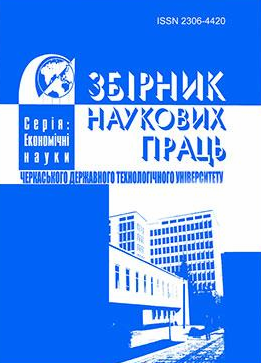FEATURES OF BUSINESS NEGOTIATIONS IN COMMERCIAL COMPANIES
DOI:
https://doi.org/10.24025/2306-4420.0.48.2018.126882Ключові слова:
interested parties, business negotiations, organizational culture, strategyАнотація
In unstable economic conditions for businesses, the need for constructive solution of organizational conflicts between interested parties is of great importance. The need for special management tools that can integrate the goals and interests of all project participants and find an effective way out of conflict situations is emerging. The purpose of this work is to study the peculiarities of conducting business negotiations in commercial companies. It is carried out with the help of a questionnaire, the analysis of small business companies from various industries (agriculture, retail and wholesale trade, etc.) in Cherkasy region with a weak and average level of organizational structure, and interviewing of the personnel. The problem areas of the companies under study and features of conducting business negotiations based on the data analysis from the questionnaire are identified. The analysis of styles and strategies of negotiations and the formulation of various possible scenarios for their development allow to develop practical recommendations for managers to hold negotiations between interested parties. A situational model for choosing a rational strategy for negotiations is developed.
Keywords: interested parties, business negotiations, organizational culture, strategy.
Посилання
Tarasyuk, G. M. (2004) Project management: textbook. Kyiv: Karavela, 344 p.
Bushuyev, S. D., Morozov, V. V. (1999) Dynamic leadership in project management: monograph. Kyiv: Ukrainian association of project management, 312 p.
Kolomytseva, O. V. (2013) Problem-oriented project management in food companies. Collection of scientific works of Odesa National Economic University. Bulletin of social-economic research. Odesa: ONEU, № 1 (48), pp. 104–109.
Romanov, T. V., Cherednychenko, O. M. (2012) Communication management and ways to overcome communication barriers in projects. Lugansk: SNU named after V. Dal, № 3 (43), pp. 99–106.
Zavadsky, Y. S. (1998) Management: monograph. Kyiv: Ukrainian- Finnish institute of management and business, 524 p.
Vatslavyk, P., Beavin, J., Jackson, D. (2000) Psychology of interpersonal communications. SPb: Speech, 446 p.
Helrigel, D., Slokum Jr., J., Woodman, R. V., Branning, N. S. (2011) Organizational behavior. Kyiv: Osnovy, 726 p.
Verba, V. A., Zagorodnikh, O. A. (2000) Project analysis. Kyiv: KNEU, 322 p.
Kucherenko, V. R., Markitan, O. S. (2005) Management of business projects: textbook. Kyiv: Center of educational literature, 280 p.
Yaroshenko, F. O. (2010) Management of innovative projects and organizational programs: monograph. Kyiv: New print, 160 p.
Tyan, R. B., Holod, B. I., Tkachenko, V. A. (2004) Project management. Kyiv: CNL, 224 p.
##submission.downloads##
Опубліковано
Номер
Розділ
Ліцензія
Авторське право (c) 2019 Olena Kolomytseva, Maciej Borski, Angelina Karakai

Ця робота ліцензується відповідно до Creative Commons Attribution-NonCommercial 4.0 International License.
Автори, які публікуються у цьому журналі, погоджуються з наступними умовами:
Автори залишають за собою право на авторство своєї роботи та передають журналу право першої публікації цієї роботи на умовах ліцензії Creative Commons Attribution License, котра дозволяє іншим особам вільно розповсюджувати опубліковану роботу з обов'язковим посиланням на авторів оригінальної роботи та першу публікацію роботи у цьому журналі.
Автори мають право укладати самостійні додаткові угоди щодо неексклюзивного розповсюдження роботи у тому вигляді, в якому вона була опублікована цим журналом (наприклад, розміщувати роботу в електронному сховищі установи або публікувати у складі монографії), за умови збереження посилання на першу публікацію роботи у цьому журналі.
Політика журналу дозволяє і заохочує розміщення авторами в мережі Інтернет (наприклад, у сховищах установ або на особистих веб-сайтах) рукопису роботи, як до подання цього рукопису до редакції, так і під час його редакційного опрацювання, оскільки це сприяє виникненню продуктивної наукової дискусії та позитивно позначається на оперативності та динаміці цитування опублікованої роботи (див. The Effect of Open Access).

